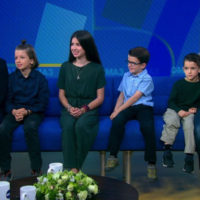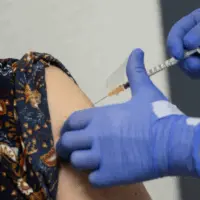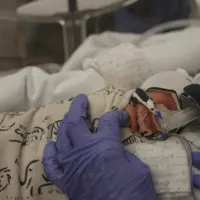
(NEW YORK) — A family of six spent the last year traveling the world together to take in as many sights as possible before retinitis pigmentosa, a rare genetic disorder, causes total vision loss for three of the four children.
The Lemay-Pelletier family — 12-year-old Mia, 10-year-old Leo, 7-year-old Colin and 5-year-old Laurent, along with mom Edith Lemay and dad Sebastien Pelletier — sat down with GMA3 to talk about what led up to the incredible journey.
After learning the news four years ago that three of her four kids were diagnosed with the disorder, it took some time to come to terms with what it would mean for their family, Lemay said.
“At first it’s denial, you think, you know, ‘It’s impossible. Nobody in my family has that. And then you get angry. You know, ‘Why me? Why does this happen to me? It’s not fair.’ And then comes sadness, you feel sorry for yourself, for your family. Really it’s only when you get to acceptance, when you accept that your children’s path is going to be different. That’s when you start thinking about the future and make real plans,” Lemay said.
When the kids were diagnosed four years ago, specialists recommended the parents start exposing their children to visual memories by showing them photos and books of the world surrounding them. But the parents decided to take it even further — allowing their kids to make those visual memories based on real-life experiences around the world.
“For us, it was just an obvious thing. Let’s take them around the world and go all in,” Pelletier said.
The eldest, 12-year-old Mia, said her favorite memory so far was riding in a hot air balloon in Turkey.
“It was just magical and amazing,” she told GMA3.
Leo, 10, is the only one of the siblings without the diagnosis.
“I feel lucky that I don’t have [it], but sad that my brothers and sister will lose their vision,” Leo said.
GMA3 surprised the family with tickets to see a Broadway show together while they are in New York, which Leo was particularly excited about.
There is currently no known cure or treatment to slow down the disease. So far, the parents said they haven’t seen any changes to their kids’ vision, besides not having the ability to see in the dark since they were born, Pelletier said. Total loss of vision is expected to occur in midlife.
Meanwhile, the parents have made it their mission to teach their children resilience, being grateful and how to adapt to new situations, Lemay said. She wants them to “focus on the positive in their life.”
Lemay and Pelletier said they felt less alone when a Quebec-based organization connected them to other families dealing with the condition.
Retinitis pigmentosa affects about 1 in 3,000 to 1 in 4,000 people worldwide, according to the National Organization for Rare Disorders. The Foundation Fighting Blindness said it has funded the launch of more than 40 clinical trials to look for potential treatments for the disorder. The organization supports research efforts by connecting patients to relevant clinical trials, along with offering free genetic testing.
“Our way to cope was to get into action. Like the hardest part for us is to not do anything. And that was the hardest part with RP, is that there’s nothing you can do,” Pelletier said.
ABC News’ Jessica Horning and Stefanie Javorsky Parasram contributed to this report.
Copyright © 2023, ABC Audio. All rights reserved.














